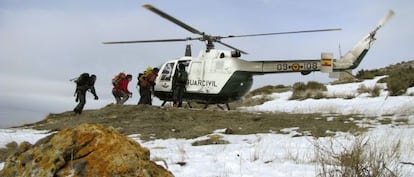Mountain lovers should be more aware of dangers, authorities warn
Rising numbers of daytrippers heading out to Spain’s sierras are resulting in more rescue operations

The well-known Ruta del Cares hiking trail covers 11 kilometers across the Picos de Europa mountain range, between the villages of Caín in León province and Poncebos in Asturias. The Environment Ministry website rates its difficulty as medium, and warns that the trail “runs along a cliff with no side protection” and that there is “a danger of falling rocks.”
Last year, one particular individual decided to ride this trail on his bike in the middle of the night. He had an accident, and the Asturias rescue services charged him for the use of the medically equipped helicopter, at a price of €2,104 an hour. It was the first time in two years that the Asturian government had charged anyone for a rescue operation, and the decision was based on what was viewed as blatant negligence by the biker.
The rise in the number of people engaging in mountain activities in Spain has also brought with it a rise in the number of accidents. Since 1990, Civil Guard rescue operations have grown almost threefold. Most hikers in need of help are inexperienced people who went out unprepared, explains Lieutenant Fernando Rivero, of the Civil Guard’s Mountain Service.
Occasionally, the rescue ends in tragedy. Only last Sunday, three members of Rivero’s agency died as they were attempting to rescue a mountaineer in León. The man was an experienced athlete who had insurance and good equipment, but that is not always the case.
The numbers
A hike in hikers. Spain is one of the most mountainous countries in Europe. Around 76 percent of its surface area is between 500 and 1,000 meters above sea level, and 24 percent is more than 1,000 meters above sea level. Several studies by the Spanish Tourism Institute have discussed this enormous potential. Climbing federation licenses have grown from 88,323 in 2003 to 169,188 in 2013.
Types of rescue. In 2013 the Civil Guard went out on 892 rescue operations, in which 94 mountaineers were found dead, 475 injured and 1,010 unharmed. Of these, 362 people had been hiking, 123 had gone off the marked path and ventured into abrupt terrain, 95 were canyoneering and 38 were skiers.
The causes. In 39.8 percent of rescues, the accident was the result of "overestimating one's own abilities," according to the Civil Guard. This is followed by "lack of technical expertise or experience" (31.95 percent) and "deficient planning" (29 percent), meaning that the hiker failed to bring enough food and water, a charged cellphone, warm clothes and so on. Truly inevitable causes, such as a rock suddenly falling on someone, make up only three percent of all rescue cases. Between two and three percent of rescues involved seasoned mountaineers who somehow lost their way.
Faced with growing numbers of casual day-trippers who end up stranded on a mountain, several regional governments have announced that they will charge for the work involved in getting people home safe. Besides Asturias, the Basque Country, Castilla y León, Catalonia, Navarre, the Canary Islands and Cantabria have also set hourly fees that range from €30 for a 4x4 vehicle to around €2,000 for a fully equipped medical helicopter. And then there is the price of the manpower: between €30 and €40 per officer sent out to help.
But the truth is these fees are rarely charged because they are meant more as a deterrent than as a way to collect money, notes José Luis Villaverde, director general of the Asturian justice and home affairs department. What’s more, it is very hard to prove that negligence was involved. Castilla y León has yet to charge anyone. Navarre and the Basque Country have been more aggressive, and have collected the fees 10 times each.
A spokeswoman for the Navarrese government added that many of those rescued seem unaware of the risk they have created when giving media interviews afterwards. “They sound like they think they’ve simply had a fun adventure,” she said.
The fees “have a positive side and a negative side,” says Lieutenant Rivero. “On one hand, people refrain from calling the rescue services unless it is actually necessary; on the other hand, it is all too easy for someone to delay the call until it is too late.”
The Civil Guard rescue units (GREIM), which have 254 specialized agents working out of 26 base camps, never charge for their help. It is the regional rescue services, which work in tandem with the latter, that occasionally send the bills.
Mountaineering federations oppose the fees, considering them a form of co-payment that does not work. “Sanction-based policies are useless, all they do is afford questionable short-term results,” writes a spokesman for the Spanish Federation of Mountain and Climbing Sports (FEDME).
But Lluís Simó, of the Federation of Catalan Hiking Associations, admits that the initiative “has an awareness-raising effect” even if he also opposes the fees. Catalonia was the first region to set fees, back in 2009.
Statistics show that mountain rescues in the region grew from 416 in 2009 to 697 in 2013. GREIM’s own rescues also spiked from 779 to 892. The reason, say the experts, is a general rise in the number of people doing mountain activities.
“It used to be that only villagers and hiking club members went out to the mountains, but these days everyone is going,” notes Ramón Parés, the Catalan government’s director general for prevention issues.
Mountaineers note that the biggest expenses, in the event of an accident, are not derived from the rescue itself but from hospital treatment and work leave.
Tu suscripción se está usando en otro dispositivo
¿Quieres añadir otro usuario a tu suscripción?
Si continúas leyendo en este dispositivo, no se podrá leer en el otro.
FlechaTu suscripción se está usando en otro dispositivo y solo puedes acceder a EL PAÍS desde un dispositivo a la vez.
Si quieres compartir tu cuenta, cambia tu suscripción a la modalidad Premium, así podrás añadir otro usuario. Cada uno accederá con su propia cuenta de email, lo que os permitirá personalizar vuestra experiencia en EL PAÍS.
¿Tienes una suscripción de empresa? Accede aquí para contratar más cuentas.
En el caso de no saber quién está usando tu cuenta, te recomendamos cambiar tu contraseña aquí.
Si decides continuar compartiendo tu cuenta, este mensaje se mostrará en tu dispositivo y en el de la otra persona que está usando tu cuenta de forma indefinida, afectando a tu experiencia de lectura. Puedes consultar aquí los términos y condiciones de la suscripción digital.









































